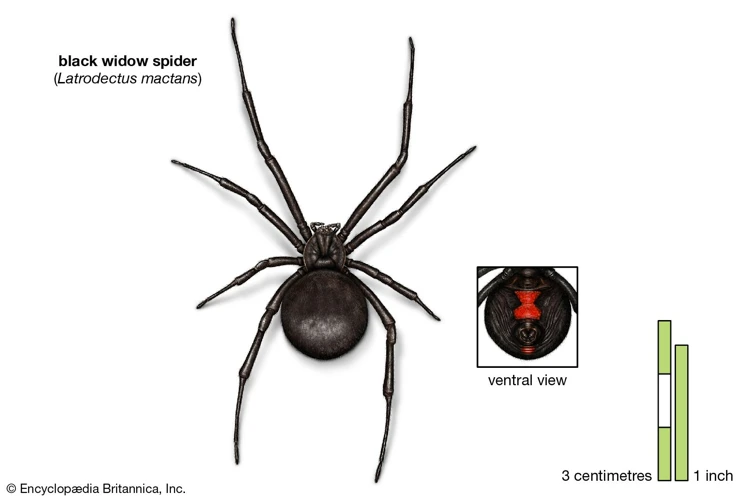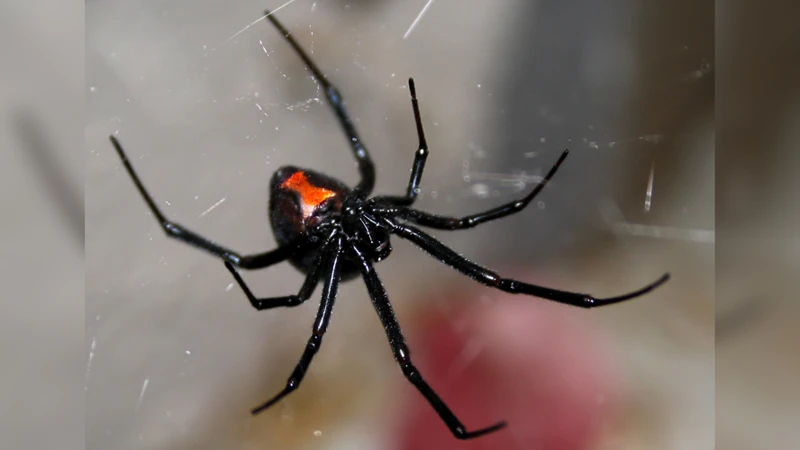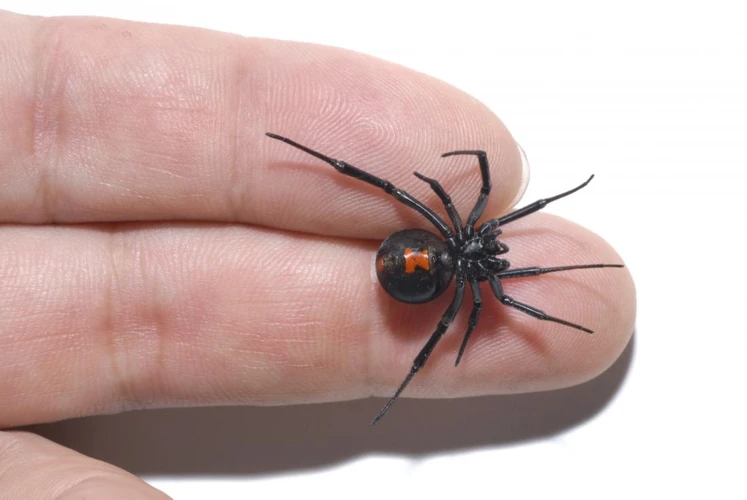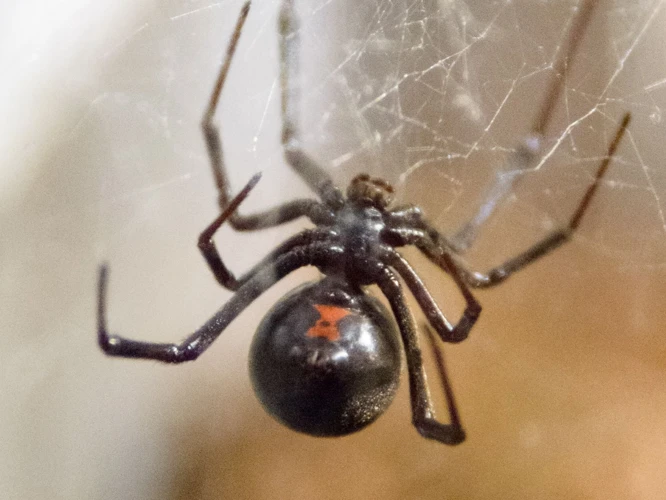Introduction

The world of venomous creatures is both fascinating and inherently dangerous. One such creature that has garnered significant attention is the black widow spider. Known for its distinctive red hourglass marking and neurotoxic venom, this spider has a reputation for being highly dangerous to both prey and humans alike. In this article, we will explore the effects of black widow spider venom on other animals, including the neurotoxic and enzymatic properties of the venom, its impact on prey and predators, and the symptoms and treatment of a black widow spider bite in humans. Let’s dive into the science behind this notorious arachnid.
Overview of Black Widow Spiders
Black widow spiders are members of the Latrodectus genus and are found across the globe in warm and temperate regions. They belong to the same family of spiders as the brown widow and redback spider. The female black widow spider is easily recognizable by her glossy black body, round abdomen, and distinctive red hourglass marking on the underside of her abdomen. The males, on the other hand, have smaller, less conspicuous bodies and lack the female’s characteristic markings.
Black widow spiders are known for their potent venom, which they use to subdue their prey. The venom is a complex mixture of neurotoxins and enzymes that cause a range of physiological effects in animals that come into contact with it. This venom has been the subject of much research, and scientists have made significant discoveries about its components, including its role in evolution and the nervous system.
Black widow spiders thrive in a wide range of environments, including deserts, forests, and wetlands. They are highly adaptable and can live in close proximity to humans, often hiding in undisturbed areas such as basements, garages, and woodpiles. While they are typically non-aggressive and only bite in defense, their bites are venomous and can cause severe symptoms in humans and other animals.
Despite their notoriety, black widow spiders play an important role in the ecosystem by controlling the population of insect pests. While their venom can be dangerous, it is also used in the development of antivenom treatments for black widow bites. Understanding the habitat, bite susceptibility, and risk factors associated with black widow spiders can help individuals take precautions to avoid bites and seek prompt medical attention when necessary. If you want to learn more about the history, components, and risk of black widow venom, you can click on these links: /history-black-widow-venom/, /understanding-black-widow-venom-components/, and /black-widow-venom-risk/.
How Black Widow Spider Venom Works

Have you ever wondered how a tiny spider can produce such a deadly venom? Black widow spiders are notorious for their potent venom, which contains a mixture of neurotoxic and enzymatic compounds. The way black widow spider venom works is a complex process that can cause severe reactions in its prey, predators, and even humans. The venom can attack the nervous system and lead to paralysis or death in prey and predators. On the other hand, humans can experience various symptoms, including severe pain and muscle cramps, from a black widow spider bite. Let’s dive deeper into the mechanisms of black widow spider venom and discover more about its effects.
Neurotoxic Properties
Black widow spider venom is composed of several different toxins, each with its own specific properties. One of the most well-known effects of black widow spider venom is its neurotoxic properties. The venom contains a toxin called alpha-latrotoxin, which targets the nervous system and affects the way nerve cells communicate with each other.
The neurotoxic properties of black widow spider venom can lead to:
- Muscle spasms: The venom can cause involuntary muscle contractions, which can be painful and even dangerous if they affect critical muscles, such as those involved in breathing.
- Respiratory problems: In severe cases, black widow spider venom can cause respiratory failure.
- Increased heart rate: The venom can cause a rapid heartbeat, which can further exacerbate other symptoms.
- Anxiety: The neurotoxic effects of the venom can cause anxiety and other psychological symptoms.
Interestingly, although black widow spider venom is dangerous to humans, it evolved as a defense mechanism against insects rather than humans. The venom works by targeting the nervous systems of insects and other small prey, effectively paralyzing them and making them easier to catch and consume.
If you or someone you know is bitten by a black widow spider, it is important to seek medical attention immediately. In some cases, antivenom may be necessary to counteract the effects of the venom. If left untreated, a black widow spider bite can be potentially life-threatening.
Research on the neurotoxic properties of black widow spider venom has shown that this venom can have a profound effect on the nervous system, and studies are ongoing to better understand its effects and potential medical applications.
It is clear that black widow spider venom is a potent and dangerous toxin, with the potential to cause serious harm to both prey and predators alike. However, with careful attention and prompt medical care, many of its negative effects can be managed or even reversed.
Enzymatic Properties
Black widow spider venom has enzymatic properties, meaning it contains enzymes that can break down biological molecules in their prey. The venom contains enzymes such as hyaluronidase, which breaks down hyaluronic acid found in the extracellular matrix of tissues, making it easier for the venom to spread through the prey’s body. Additionally, it contains proteases which break down proteins, such as the ones found in the prey’s muscles.
Black widow spider venom is especially potent due to its unique combination of enzymes, which not only helps in killing the prey but also aids in digestion. It has been found that this venom contains more than 20 different enzymes, each serving a specific function in aiding the spider’s feeding process.
Interestingly, researchers have also found that some of the enzymes present in black widow spider venom have potential therapeutic uses. For example, some enzymes have a thrombolytic effect, which can help break down blood clots and prevent heart disease. Others have antimicrobial properties and could potentially be used as antibiotics.
Understanding the enzymatic properties of black widow spider venom is crucial in developing antivenom to treat bites. Antivenom works by neutralizing the venom’s enzymes, preventing them from causing further harm. Without proper antivenom, individuals bitten by black widow spiders can experience severe symptoms, including muscle spasms, abdominal pain, and respiratory failure.
To learn more about antivenom and how it works, read our article on black widow spider antivenom.
Effects of Black Widow Spider Venom on Prey

The potency of Black Widow spider venom is known to have a profound impact on its prey. The venom is specifically designed to ensure the prey is instantly paralyzed and immobilized, making it easier for the spider to consume its meal. The neurotoxic and enzymatic properties of the venom are a deadly combination, making it one of the most dangerous venoms in the animal kingdom. The effects of the venom on prey have intrigued scientists for years, bringing us closer to unlocking the secrets of this deadly creature’s hunting abilities. Let’s explore further the effects of the venom on Black Widow’s prey.
Paralysis and Death
When the black widow spider injects its venom into its prey, the neurotoxins take effect, causing the victim to experience muscle contractions and spasms, along with paralysis. The venom also disrupts the nervous system, leading to respiratory failure, causing death. This powerful venom is essential for the survival of black widow spiders, as it helps them to catch and consume their prey.
The effects of black widow spider venom vary depending on the size and susceptibility of the victim. Insects like grasshoppers, crickets, and flies are among the most commonly targeted prey of black widows. However, even larger animals like lizards and small mammals have been known to fall victim to these spiders. The table below provides a summary of the effects of black widow spider venom on various animals:
| Animal | Effect of Venom |
| Small insects (flies, ants, etc.) | Paralysis, death |
| Small lizards | Extreme pain, muscle contractions, labored breathing, possible death |
| Small mammals (rodents, rabbits, etc.) | Severe pain, muscle contractions, respiratory distress, death |
It is important to note that while black widow spiders are venomous, they only bite humans as a last resort, when they feel threatened or cornered. However, when they do bite humans, the results can be quite severe. In the next section, we will discuss the effects of black widow venom on humans in more detail.
Anchor text: Treating a black widow spider bite at home
Impact on the Ecosystem
The impact of the black widow spider’s venom on the ecosystem is a topic that has caused much debate amongst researchers. While these spiders are an important part of the food chain and help to control insect populations, their venom can also have negative effects on other animals.
1. Insect populations: Black widow spiders are known to be effective predators of insects, including pests such as cockroaches, mosquitoes, and flies. By keeping these populations in check, they help to maintain balance in the ecosystem.
2. Competition with other predators: Despite their effectiveness as insect predators, black widow spiders can also come into competition with other predators, such as birds, lizards, and other spider species. These animals may also prey on insects, and the presence of black widows can reduce their food sources and potentially impact their survival.
3. Bird populations: In some regions, black widow spiders can pose a threat to bird populations. Birds that consume these spiders may suffer from paralysis or even death due to the neurotoxic properties of the venom. This can impact the overall health of bird populations in the area.
4. Insectivorous mammals: Insectivorous mammals such as shrews and bats may also be impacted by the presence of black widow spiders. These animals feed on insects, and the presence of venomous spiders may reduce their food sources or even result in their death if they consume the spiders.
It is important to note that the impact of black widow spiders on the ecosystem is not entirely negative. These spiders are an important part of the food chain and help control insect populations. However, their presence may cause competition with other predators and potential harm to other animals. For more information on the black widow spider and its venom, see our article on the effects of black widow spider venom on prey or the evolution of black widow spider venom.
Effects of Black Widow Spider Venom on Predators

As frightening as it may seem, even the predators of black widow spiders are not immune to the effects of their venom. The potent neurotoxins in the spider’s bite can lead to severe reactions and even death in animals that would otherwise be considered formidable predators. This is due to the fact that the venom has evolved to specifically target the nervous system of its prey, making it extremely effective at incapacitating a wide range of organisms. Throughout history, many predators have learned to steer clear of these venomous arachnids as a result. But what happens when a predator does come into contact with a black widow spider? We’ll explore the effects of black widow spider venom on predators in detail below.
Severe Reactions and Death
When it comes to predators of the black widow spider, their reactions to the venom can vary. In some cases, predators may experience severe reactions and even death. This is because the neurotoxic properties of the venom can affect the predator’s nervous system, causing paralysis and ultimately leading to death.
While some predators may have developed immunity to the venom, others may not be so lucky. For example, birds and small mammals like rodents may fall prey to black widow spiders and suffer severe consequences.
It is worth noting that the black widow spider often tries to avoid predators by hiding in its web or by biting as a last resort. However, if it feels threatened, it may release its venom in defense.
Interestingly, some predators have developed strategies to avoid the harmful effects of black widow spider venom. For example, some snake species like the kingsnake and the milk snake are resistant to the venom due to their specialized enzymes that break down the toxic components. Additionally, some birds of prey have learned to remove the venom-filled abdomen of the spider before consuming it, thus avoiding potential harm.
Nevertheless, some predators may still fall victim to the venom, especially if they are caught off guard or if they have not developed the necessary adaptations. As a result, predators that reside in areas with a high concentration of black widow spiders may have a higher susceptibility to their bites.
While black widow spider venom can be dangerous to predators, some have developed ways to avoid harm. However, for those not adapted to the venom, the consequences can be severe and even deadly.
For more information on the dangers of black widow spider venom, you can check out our article on why black widow venom is so dangerous. If you want to learn more about black widows and their habitat, you can read our article on black widow habitat and bite susceptibility.
Survival Strategies for Predators
Despite the deadly effects of black widow spider venom on predators, some species have evolved survival strategies to combat these spiders. Let’s take a look at some of these survival strategies in the table below:
| Species | Survival Strategy |
|---|---|
| Jumping spiders | Jump on the black widow spider’s web and cut it down before the black widow can attack. |
| Praying mantises | Use their powerful front legs to snatch the black widow spider up and eat it. |
| Birds | Remove the black widow spider’s venomous fangs before consuming it. |
| Wasp species | Sneak up on the black widow spider, paralyze it with their own venom, and lay their eggs on the spider, which hatches and devours the paralyzed spider as food. |
As we can see, predators have developed a variety of techniques to avoid being preyed upon by black widow spiders. From physically removing the spider from its web to neutralizing the spider’s venom with their own, these species are able to protect themselves and survive in an ecosystem that includes one of the most venomous spiders in the world.
How Black Widow Spider Venom Affects Humans
As fascinating as they are terrifying, Black Widow Spiders have a venom that is lethal to their prey and can even affect humans. If you’ve ever wondered about the effects of Black Widow Spider venom on humans, you’ve come to the right place. In this section, we’ll explore how the venom affects humans, the symptoms of a bite, and treatment options. With a mix of neurotoxic and enzymatic properties, this venom is designed to take down prey much larger than itself, and its effects on humans can be just as dangerous. Let’s delve deeper into the topic with a sense of perplexity and curiosity.
Symptoms of a Black Widow Spider Bite
When a Black Widow Spider bites a human, the venom quickly spreads through the bloodstream, causing various symptoms. Here are some of the symptoms that a person may experience after being bitten by a Black Widow Spider:
- Pain: The bite of a Black Widow Spider can be very painful and may feel like a pinprick or a sharp stabbing sensation.
- Redness and Swelling: The area around the bite may become red and swollen, and the bite mark may appear as two puncture wounds.
- Muscle Cramps: Muscle cramps and spasms are common symptoms of Black Widow Spider bites. They usually start within a few hours after the bite and can be severe, causing pain and stiffness in the affected muscles.
- Abdominal Cramps: Abdominal cramps and pain may occur, and the person may experience nausea, vomiting, and diarrhea.
- Sweating: The person may sweat profusely, especially around the site of the bite.
- Headache and Dizziness: The person may experience headaches, dizziness, and difficulty breathing.
- Fever: A mild fever may develop after a Black Widow Spider bite.
- High Blood Pressure: In some cases, Black Widow Spider venom can cause high blood pressure, which may lead to complications such as heart attack or stroke.
If a person experiences any of these symptoms after being bitten by a Black Widow Spider, they should seek medical attention immediately. Black Widow Spider bites can be serious and can even be fatal in rare cases, so it’s important to receive prompt treatment.
Treatment for Black Widow Spider Bites
If you are bitten by a black widow spider, it is important to seek medical attention immediately. The effects of the venom can be severe and potentially life-threatening if left untreated. Treatment for black widow spider bites may include a combination of the following:
| Treatment | Description |
|---|---|
| Pain medication | Over-the-counter pain relievers such as ibuprofen or acetaminophen may be used to manage pain. |
| Antivenom | In severe cases, antivenom may be administered to neutralize the venom and prevent further damage. |
| Muscle relaxants | These may be prescribed to help alleviate muscle cramping or spasms caused by the venom. |
| Wound care | Cleaning the bite area and applying antibiotic ointment can help prevent infection. |
| Rest and hydration | Resting and staying hydrated can help the body recover from the effects of the venom. |
While black widow spider bites can be serious, prompt medical treatment can help minimize the effects and improve chances of a full recovery. Remember to always be cautious around these spiders and seek professional help if bitten.
Conclusion
In conclusion, the black widow spider and its venom have a significant impact on the ecosystem and other animals. The neurotoxic and enzymatic properties of the venom make it lethal to most prey and can have severe effects on predators. The prey often experiences paralysis and death within hours of being bitten, while predators may face severe reactions and death from the venom. However, some predators have developed survival strategies to avoid being affected by the venom.
Moreover, black widow spider bites can also have severe effects on humans. The bite causes painful symptoms such as muscle spasms, cramps, and extreme pain. It is crucial to seek proper medical attention as soon as possible to treat the symptoms and prevent further complications. Anti-venom is available, but it is only used in severe cases where the patient’s life may be at risk.
It is essential to recognize the venom’s effects and risks posed by black widow spiders to prevent accidental bites and reduce the impact on the ecosystem. People living in areas known to have black widow spiders should take the necessary precautions when working outside or hiking to avoid accidental bites.
In conclusion, black widow spider venom is a powerful yet dangerous substance that has significant effects on the ecosystem and other animals. Being informed and taking the necessary precautions can help protect against the potential dangers of black widow spiders.
Frequently Asked Questions
What is the habitat of black widow spiders?
Black widow spiders can be found in warm and dry regions around the world, including deserts, forests, and grasslands.
What do black widow spiders eat?
Black widow spiders feed on a variety of insects, including flies, mosquitoes, and grasshoppers, as well as other spiders.
How long do black widow spiders live?
Black widow spiders can live up to three years, with the females typically living longer than the males.
What is the size of a black widow spider?
Black widow spiders range in size from about 1/2 inch to 1 inch in length, with the females typically larger than the males.
What are the neurotoxic properties of black widow spider venom?
Black widow spider venom contains a neurotoxin called alpha-latrotoxin, which affects the nervous system by causing the release of neurotransmitters and disrupting communication between nerve cells.
What are the enzymatic properties of black widow spider venom?
Black widow spider venom also contains enzymes that break down proteins, which helps to digest their prey and cause tissue damage in the victim.
What is the impact of black widow spiders on the ecosystem?
Black widow spiders are an important part of the food chain, as they help to control the population of insects. However, their venom can also have negative effects on other animals, including predators and prey.
What are the symptoms of a black widow spider bite?
Symptoms of a black widow spider bite can include muscle cramps, spasms, and pain, as well as nausea, vomiting, and fever.
How can black widow spider bites be treated?
Treatment for black widow spider bites may include pain relievers, muscle relaxants, and antivenom, as well as seeking medical attention if symptoms are severe.
How can humans protect themselves from black widow spiders?
To protect yourself from black widow spiders, it is important to wear gloves and long clothing when working or playing in areas where they may be present, as well as being cautious when handling objects in dark or secluded areas.







